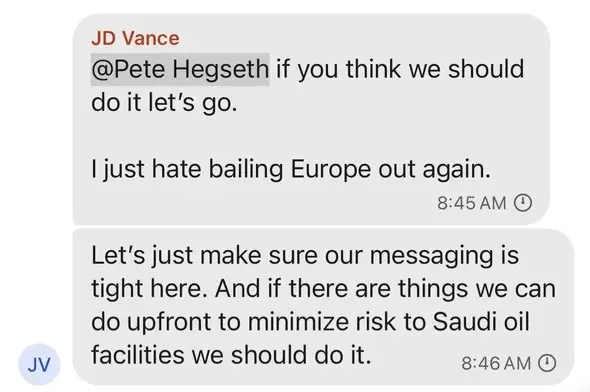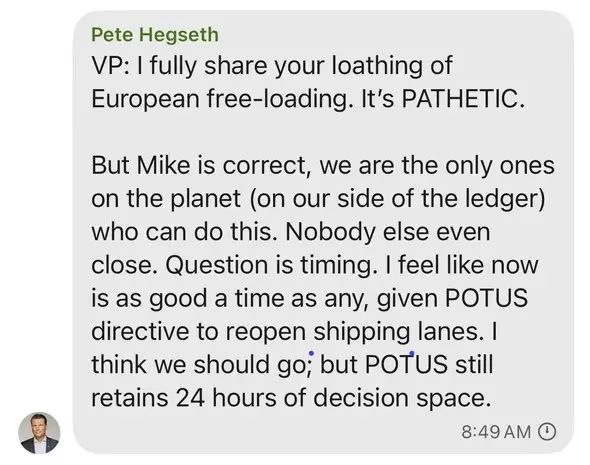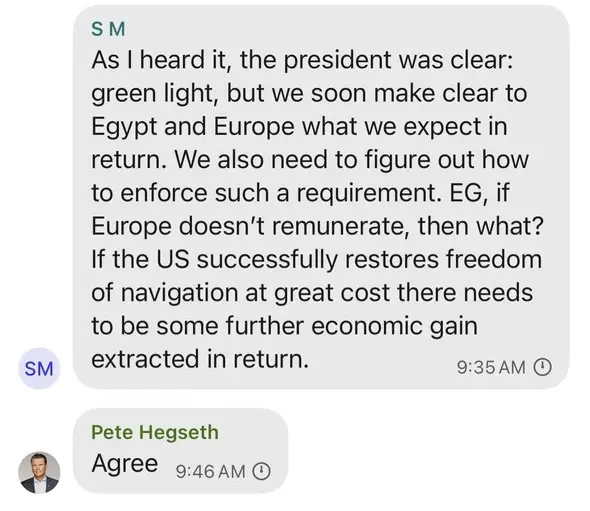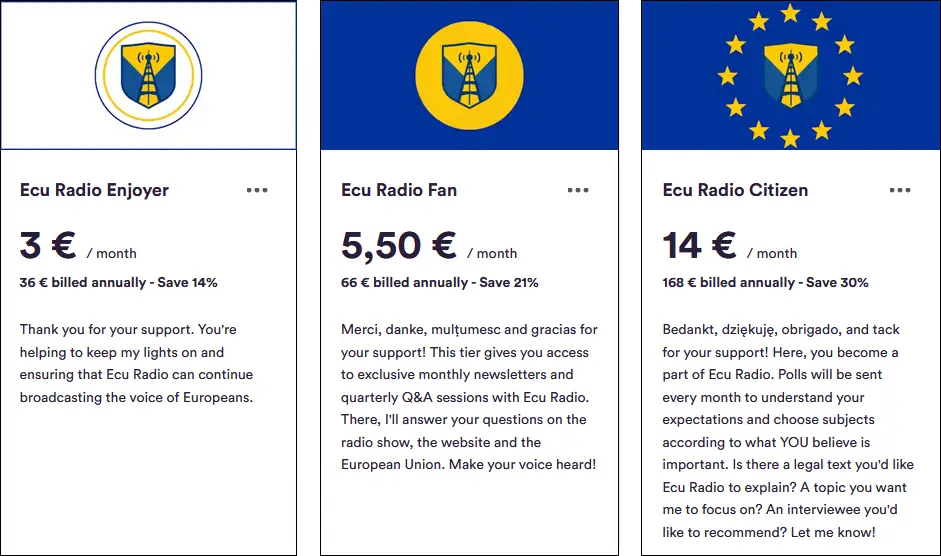The struggle for Europe’s Autonomorphosis and the acquisition of Hard Power has been sharply brought into focus today, following the leak of texts exchanged between high-ranking American administrators, revealing a deeply engrained loathing of Europe.
The conversation initially centered around a potential strike against the Houthis—a jihadist group based in Yemen that has been disrupting maritime trade through the Suez Canal. At one point, the discussion turned to the benefits such an action could bring to the European continent.
These perceived benefits were viewed as problematic by JD Vance, Vice-President of the United States. He expressed his concerns:
I think we are making a mistake. 3% of US trade runs through the Suez. 40 percent of European trade does. There is a real risk that the public doesn’t understand this or why it’s necessary. The strongest reason to do this is, as POTUS said, to send a message.
Vance’s remarks suggest that the protection of maritime trade primarily benefits European allies, now confirmed as either rivals or pests in his eyes. In response, Secretary of Defense Pete Hegseth argued:
VP, I understand your concerns and fully support raising them with POTUS. There are important considerations, many of which have uncertain outcomes (economy, Ukraine peace, Gaza, etc.). Messaging will be tough no matter what—nobody knows who the Houthis are. We need to stay focused on two points: 1) Biden failed, and 2) Iran funded the Houthis.
Beyond the implications this leak raises regarding data protection, the goals of the Trump administration, and their competency to lead actions professionally, the underlying contempt for the European continent is the most concerning issue. Despite Hegseth’s arguments about the potential benefits to the U.S. (such as “restoring freedom of navigation” and “reestablishing deterrence”), Vance ensured that his core objections were clearly articulated.

Hegseth, on his part, made sure to align with his Vice-President, sharing his loathing of Europe.

As a final note, an account identifying itself as S M, presumably Stephen Miller, the deputy White House chief of staff, suggested that such an operation should be leveraged for gain.

Several conclusions can be drawn from this:
- This reflects the Trump administration’s aggressive stance towards Europe, exemplified by JD Vance’s speech at the Munich Security Conference. There, he questioned European democracy, comparing “conditions in parts of Europe to those in authoritarian regimes”, as noted by Boris Pistorius, the German defense minister. This perspective is particularly disqualifying, given the relative health of European democracy compared to the threats issued by Vance’s administration over the annexation of Greenland.
- The acquisition of hard power is more urgent than ever. The current American administration is fiercely transactional, believing that any action supporting Europe, even indirectly, should be rewarded or, in Miller’s terms, “remunerated.” Without hard power, the current American leadership is likely to exploit Europe’s lack of it for any operation involving European interests. Failing to acquire hard power would mean surrendering sovereignty.
- In this context, NATO appears “braindead” once more, as President Macron of France stated before the War in Ukraine briefly revived it. Support for Ukraine is on shaky ground, as is future support for Europe against potential aggressions.
- Surprisingly, President Trump emerges in this text as a figure balancing the more extreme views within his administration towards Europe. He seems more focused on the benefits this operation would bring to the U.S. rather than those for Europe. However, at 78 years old, he is likely to pass the torch to younger figures like JD Vance in the near future. If such a transition were to occur, Europe would face even greater danger.
Cautious optimism is however warranted, as such a leak may push opinions and leaderships towards a more aggressive acquisition of hard power. The concept of “Autonomorphosis”, as we introduced, requires such sharp messages.
Ecu Radio needs your support
Ecu Radio is an independent news website and podcast show, run full-time by a single dedicated contributor (for now). Support our work, get exclusive perks and help keep us going, starting from only 3€ per month. Let's unleash Europe's potential together!
Click here to support Ecu Radio

